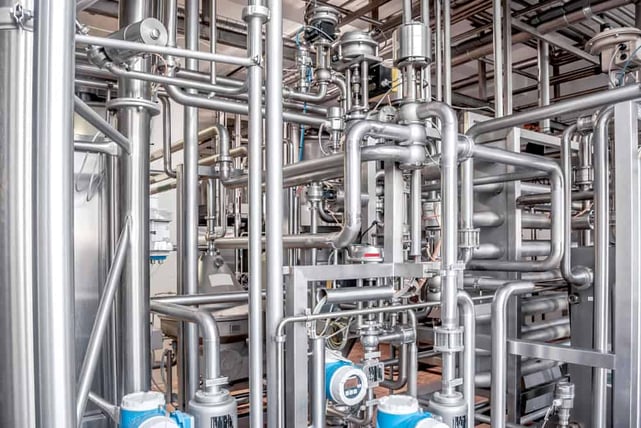Share this
Meeting Challenges in Process Piping Design and Assembly
by Morgan Zealear on 2/17/23 9:00 AM

Process piping in refineries and other industries includes components such as pipes, valves, regulators, and other control systems to support the regulation and transportation of the process fluid throughout the facility. The success of the piping system lies in the ability of these components to work together to enhance the safety and efficiency of the process. But this is one of the major challenges that most industries face during process piping design and assembly.
The requirement for strict adherence to industrial process conditions presents the challenge in component selection and system design for process piping. Let’s look at some of these challenges and discuss some potential solutions.
Process Piping Design: What To Look For
Process piping refers to the network of pipes and supporting fluid control systems that transport the fluids involved in the given industrial process. For instance, they transport raw materials like crude oil into the distillation tower and the finished product, i.e., oil or gas, to the shipping terminals. Often, these piping systems work under extreme process conditions like high temperature and pressure limits or with hazardous fluids. In such a scenario, a minor discrepancy in material selection and design of any component can lead to leaks or system failure.
To ensure the long-term success of the process piping system, manufacturers often look for the following qualities:
- The process piping design needs to adhere to the relevant industry standards. ASME B31.3 covers the process piping requirement for a wide range of industries, including petroleum refineries, chemical processing, semiconductor fabrication, and pharmaceutical industries.
- The process piping assembly must be safe, reliable, and durable. With the selection of the right material for the process fluid and the ideal component with compatible pressure/temperature specifications, it is possible to minimize the risks of failure, thus, preventing operational downtime or accidents.
- The process piping assembly must be easy-to-reach and flexible enough for easy maintenance and optimization.
Challenges in Process Piping Design
Some of the major issues industries face with process piping design and assembly are standardization and quality control. Often, due to the process conditions and variations in operational requirements such as temperature, pressure, and flow, standardizing design and assembly practices can be difficult. The subtle details to note when selecting material and component specifications further increase the complexity of standardized process piping design and operational quality control.
Industries are able to address these challenges by ensuring compliance with established standards and in-house guidelines for design and assembly. A standardized process piping design makes the installation, diagnostics, and repairs/replacement much simpler and more cost-effective. Using high-quality tube fittings that can be installed and repaired with standard wrenches, for example, reduces complexity and lowers repair costs. Your local fluid system expert can not only help you select the right material but also provide guidance to achieve the ideal design accuracy and precision.
Reliable Design and Assembly With Swagelok
When assembling the process piping for your facility, expertise from specialized personnel is a great advantage. Swagelok provides consultation services from experts trained in system design and optimization roles. For your Northern California facility, they can help you identify the existing or potential risks in assembly and help establish a standardized design plan that ensures safety and reliability.
Additionally, field engineers can help you select the right components from a vast selection of valves and control units so that they are compatible with the process conditions of the subsystems and beyond. Through a detailed understanding of your requirement, we provide quality process piping design solutions that are productive and cost-efficient for your project.
To find out more about how Swagelok Northern California can help you make a selection of ideal component and assembly options for process piping design, contact our team today by calling 510-933-6200.
 About Morgan Zealear | Product Engineer, Assembly Services
About Morgan Zealear | Product Engineer, Assembly Services
Morgan holds a Bachelor of Science in Mechanical Engineering from University of California at Santa Barbara. He is certified in Section IX, Grab Sample Panel Configuration and Mechanical Efficiency Program Specification (API 682), and he is well versed in B31.3 Process Piping Code. Before joining Swagelok Northern, he was a manufacturing engineer at Sierra Instruments, primarily focused on capillary thermal meters for the semiconductor industry (ASML).
Share this
- Archive (465)
- Assembly Services (207)
- About (100)
- Seal Support Systems (96)
- Best Practices (88)
- Training Services (74)
- Fittings (51)
- Semiconductor Applications (49)
- Hoses and Flexible Tubing (47)
- Regulators (44)
- Tubing (42)
- Grab Sampling Systems (32)
- Sampling Systems (32)
- Gas Systems (30)
- Services (30)
- Downloads (29)
- Valves (24)
- Application Support (18)
- Orbital Welding (17)
- Case Studies (13)
- Steam Systems (13)
- Frequently Asked Questions (12)
- Tools (12)
- Measurement Devices (7)
- Subsystems (6)
- Thermal Management (6)
- September 2023 (1)
- August 2023 (2)
- June 2023 (1)
- March 2023 (3)
- February 2023 (3)
- January 2023 (4)
- December 2022 (4)
- November 2022 (4)
- October 2022 (4)
- September 2022 (1)
- August 2022 (3)
- July 2022 (2)
- June 2022 (4)
- May 2022 (1)
- April 2022 (2)
- March 2022 (1)
- February 2022 (2)
- January 2022 (3)
- December 2021 (1)
- November 2021 (6)
- October 2021 (6)
- September 2021 (8)
- August 2021 (4)
- July 2021 (3)
- June 2021 (6)
- May 2021 (6)
- April 2021 (7)
- March 2021 (5)
- February 2021 (4)
- January 2021 (6)
- December 2020 (5)
- November 2020 (6)
- October 2020 (6)
- September 2020 (8)
- August 2020 (7)
- July 2020 (8)
- June 2020 (8)
- May 2020 (6)
- April 2020 (9)
- March 2020 (7)
- February 2020 (10)
- January 2020 (21)
- December 2019 (23)
- November 2019 (21)
- October 2019 (22)
- September 2019 (21)
- August 2019 (22)
- July 2019 (23)
- June 2019 (20)
- May 2019 (23)
- April 2019 (22)
- March 2019 (21)
- February 2019 (20)
- January 2019 (21)
- December 2018 (14)
- November 2018 (19)
- October 2018 (23)
- September 2018 (17)
- August 2018 (29)
- July 2018 (11)
- June 2018 (6)
- May 2018 (5)
- April 2018 (4)
- March 2018 (5)
- February 2018 (3)
- January 2018 (3)
- December 2017 (2)
- November 2017 (4)
- October 2017 (3)
- September 2017 (2)
- August 2017 (6)
- July 2017 (4)
- June 2017 (4)
- May 2017 (4)
- April 2017 (3)
- March 2017 (4)
- February 2017 (3)
- January 2017 (3)
- December 2016 (3)
- November 2016 (3)
- October 2016 (3)
- September 2016 (5)
- August 2016 (5)
- July 2016 (4)
- June 2016 (5)
- May 2016 (3)
- April 2016 (4)
- March 2016 (5)
- February 2016 (11)
- January 2016 (1)
- December 2015 (3)
- November 2015 (4)
- October 2015 (3)
- September 2015 (4)
- August 2015 (4)
- July 2015 (8)
- June 2015 (5)
- May 2015 (3)
- April 2015 (4)
- March 2015 (4)
- February 2015 (3)
- January 2015 (4)
- December 2014 (2)
- November 2014 (3)
- October 2014 (4)
- September 2014 (4)
- August 2014 (4)
- July 2014 (5)
- June 2014 (4)
- May 2014 (4)
- April 2014 (5)
- March 2014 (4)
- February 2014 (3)
- January 2014 (4)
- December 2013 (5)
- November 2013 (3)
- October 2013 (4)
- September 2013 (3)
- August 2013 (5)
- July 2013 (5)
- June 2013 (5)
- May 2013 (3)
- April 2013 (6)
- March 2013 (4)
- February 2013 (4)
- January 2013 (8)
- December 2012 (4)
- November 2012 (6)
- October 2012 (6)
- September 2012 (4)
- August 2012 (4)
- July 2012 (4)
- June 2012 (4)

.webp?width=210&height=70&name=StickyLogo%20(5).webp)